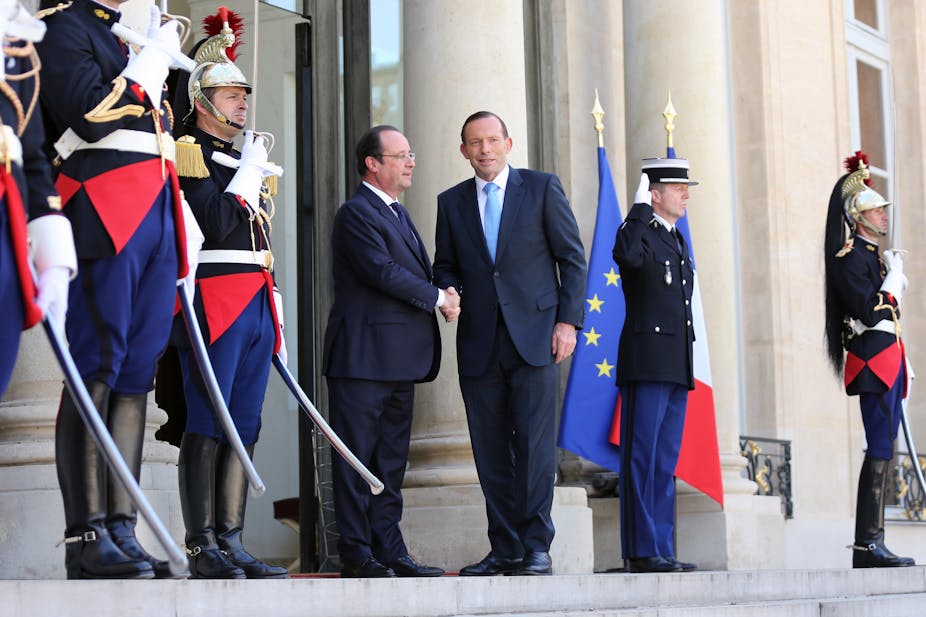When French president François Hollande rose to deliver the keynote address for the 70th anniversary of the D-Day Landings earlier this year, he set in motion an unprecedented five-year cycle of commemoration that will conclude on June 28, 2019, with the centenary of the Treaty of Versailles.
Hollande’s speech to mark the beginning of the liberation of France and Europe made no mention of the First World War. However, in the forward planning of the governments represented there, it has long been accepted that the Great War centenary will encompass the commemoration of other major conflicts of the 20th century.
Notably, it will include the 70th anniversaries of key events in the Second World War, the Korean War’s 60th anniversary and the Vietnam War’s 50th anniversary.
The D-Day commemoration built on the precedent of decennial anniversaries since the globally mediatised 40th anniversary in 1984. It has become the epitome of what French historian Olivier Wieviorka calls the “internationalisation of commemoration”. It provides a foretaste of the keynote events that the French can expect of the Great War centenary.
Above all, it is a model of “memorial diplomacy”. The French and international press were quick to seize upon this. June 6, 2014, was “a D-Day under the flag of diplomacy” (Les Echos), “a diplomatic beach” (Libération) and a day of “silent diplomacy” (Deutsche Welle).
These headlines alluded to Hollande and German chancellor Angela Merkel’s diplomatic coup in initiating a meeting between the Ukrainian and Russian presidents in the wake of the Ukrainian crisis and the re-scheduling of the G8 summit from Sochi to Brussels to the exclusion of Russia.
In the image of the events on June 6, “memorial diplomacy” is a mode of symbolic soft power politics. Sites of memory and commemorative events are used as a vehicle for inter-state and infra-state relations. This involves carefully choreographed public ceremonies at selected sites of memory on anniversaries of events of national and international significance.
These events, typically on the eve of international summits, provide a venue not just for informal discussions. They also enable a brand of “message politics”, which appeals both to domestic and international public opinion by mobilising shared histories.
The aims range from:
- renewing alliances;
- reconciling with adversaries or estranged allies;
- launching joint policy initiatives (including veterans’ pensions and victims’ compensation);
- signing treaties or defence agreements;
- boosting trade and cultural exchanges;
- promoting war tourism; and
- projecting national identities and “special relationships”.
The Great War centenary is the fruit of more than a decade of French-led multilateral co-operation at the sites of memory of the First and Second World Wars, including the Western Front and Normandy. Under president Jacques Chirac, the French Ministry of Defence began to develop a “shared memory” policy from 2002 onwards:
… to encourage, organise and improve bilateral relations between the nations and peoples which have shared a military history with France, in the course of modern conflicts since 1870, whether allies or adversaries.
The French government signed a series of memoranda of understanding with Commonwealth countries, former allies and colonies between 2002 and 2008, which have since been upgraded to reinforce co-operation. These included the French-Australian Declaration of Strategic Partnership in 2011 and the Canada-France Memorandum of Understanding for Shared Memory in 2013.

France also initiated a number of multilateral summits. These began with the First International Symposium on Shared Memory at UNESCO Paris in 2006 and culminated in a meeting of ministers from 30 countries in Paris in October 2013 to co-ordinate commemorative programs for the centenary.
The national program unveiled by Hollande in November 2013 is posited on France being the Great War’s principal theatre of conflict. In the words of Centenary Mission adviser Bernard Maris:
In 2014, France will be the world’s stage.
The choice of launch date (Bastille Day) consecrates the Great War as the second key event in the establishment of the modern French Republic (the third being the Resistance and Liberation). The program rearticulates the values of French universalism, peace and international fraternity, around a message of reconciliation – with Germany, France’s former colonies and the national community – in the service of European and national unity.
Whether unity is so easily obtained or shared memory of the war is more than a figment of the diplomatic imagination is questionable. Historians like Annette Becker argue that:
… there is absolutely no shared memory between the warring nations, and sometimes not even within the countries themselves.
However, in the absence of a “birth of the nation” narrative rooted in war memory as compelling as the Anzac myth, France has used the idea of shared memory to project its unique memorial heritage into a network of special relationships with former allies and adversaries in the pursuit of national interests, thereby placing itself centre stage geopolitically to 2018 and beyond.
Read the other articles in The Conversation’s Commemorating WWI series here.

